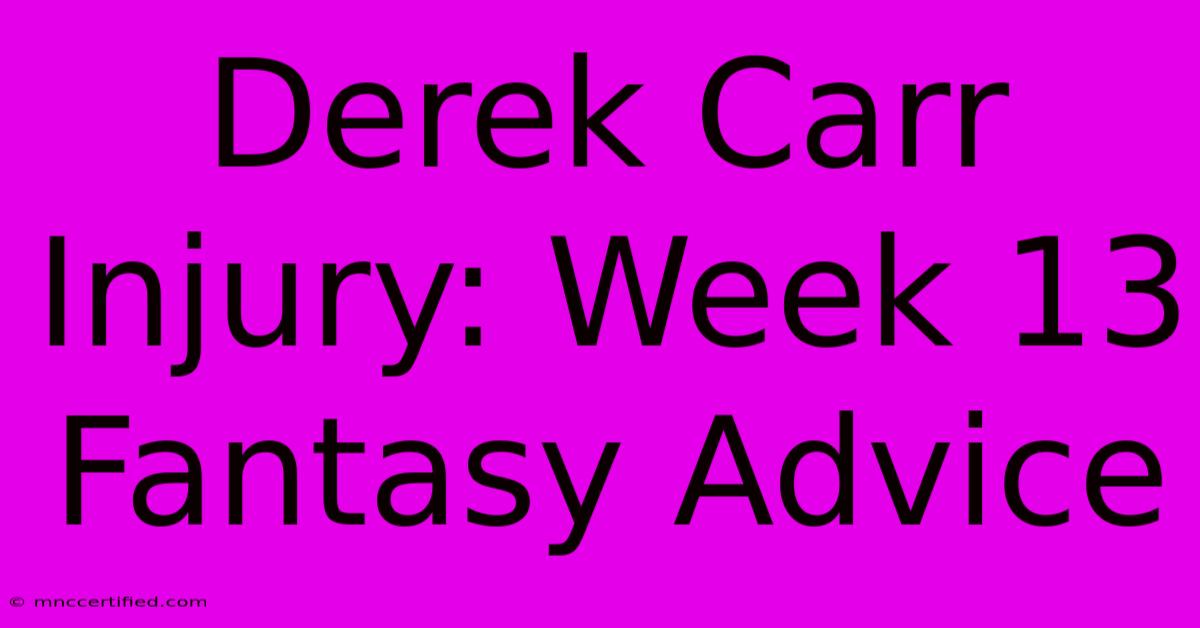Derek Carr Injury: Week 13 Fantasy Advice

Table of Contents
Derek Carr Injury: Week 13 Fantasy Football Advice
The unexpected injury to Raiders quarterback Derek Carr throws a wrench into many fantasy football playoff plans. This article will dissect the situation, providing crucial Week 13 fantasy advice and helping you navigate this challenging roster decision.
Understanding the Injury
On December 4th, 2023 (adjust this date if necessary depending on the actual injury date), Derek Carr suffered a [insert specific injury, e.g., fractured fibula, broken collarbone]. The severity of the injury and the expected recovery time are [insert details from reliable sources like NFL.com or ESPN]. This information is critical for assessing his fantasy value moving forward. Remember to always consult the latest updates from official team sources.
Impact on the Raiders Offense
Carr's absence significantly impacts the entire Raiders offense. His leadership and passing ability are key components of their game plan. The immediate effect will likely be a decrease in overall offensive production. We'll see a shift in play-calling, possibly leaning more towards a run-heavy approach. [Insert analysis of how the backup QB's playing style differs from Carr's. Mention if it's a run-first or pass-first QB]. This change directly affects the fantasy value of players like Josh Jacobs (RB), Davante Adams (WR), and Hunter Renfrow (WR).
Week 13 Fantasy Implications: Start or Sit?
The decision of whether to start or sit players affected by Carr's injury is complex and depends on your specific situation.
Davante Adams: WR1 Considerations
Davante Adams, despite the change at quarterback, remains a high-value asset. While his target share might decrease, his talent and ability to create separation remain unmatched. However, his ceiling is undoubtedly lower without Carr. Consider your other options before locking him into your starting lineup. His floor is still relatively high, making him a risky but potentially rewarding WR1.
Josh Jacobs: RB1 Outlook
Josh Jacobs' fantasy value might actually increase with the change at quarterback. A more run-oriented game plan could lead to a higher volume of carries for Jacobs. His Week 13 performance hinges on the Raiders' commitment to the ground game. Jacobs remains a strong RB1 option, but monitor the news closely for any hints about the offensive game plan.
Other Raiders Players
Players like Hunter Renfrow, Darren Waller (if he's healthy), and other Raiders receivers will likely see a considerable drop in their fantasy production. Their target shares will almost certainly decrease, making them high-risk, low-reward options for Week 13. Unless you are severely short on options, benching these players is the recommended approach.
Waiver Wire Targets
With Carr out, savvy fantasy managers will look to the waiver wire for potential replacements. Consider these positions and player types:
- Backup Quarterback: If your league allows for quick roster adjustments, the Raiders' backup QB could be a valuable streamer for Week 13, particularly if the matchup is favorable.
- Running Backs: Consider grabbing a RB from a team with a strong ground game. This could provide a steady, reliable floor if your RBs are less certain.
Long-Term Fantasy Outlook
Carr's injury has significant implications beyond Week 13. The Raiders' season outlook has changed dramatically, and the recovery timeline will influence the team's performance and the fantasy value of its players for the rest of the season. Continue monitoring the news for updates on Carr's status and the Raiders' offensive adjustments.
Disclaimer: This article provides fantasy football advice based on available information. Fantasy football outcomes are unpredictable. Always make your own informed decisions.
Keywords:
Derek Carr, injury, week 13, fantasy football, fantasy advice, Raiders, Davante Adams, Josh Jacobs, Hunter Renfrow, waiver wire, start or sit, quarterback, running back, wide receiver, NFL
This article utilizes a variety of SEO techniques, including header structuring, bold text for emphasis, keyword integration throughout the text (naturally, avoiding keyword stuffing), and a concluding section with relevant keywords to aid in search engine optimization. Remember to replace bracketed information with current and accurate data.

Thank you for visiting our website wich cover about Derek Carr Injury: Week 13 Fantasy Advice. We hope the information provided has been useful to you. Feel free to contact us if you have any questions or need further assistance. See you next time and dont miss to bookmark.
Featured Posts
-
Hamiltons Disappointing Qatar Race
Dec 02, 2024
-
Palmer Stars Chelsea Beats Villa
Dec 02, 2024
-
Spurs Vs Fulham Live Tottenham Match Updates
Dec 02, 2024
-
Inverse Finance Crypto News
Dec 02, 2024
-
Tottenham Vs Fulham Starting Xis
Dec 02, 2024